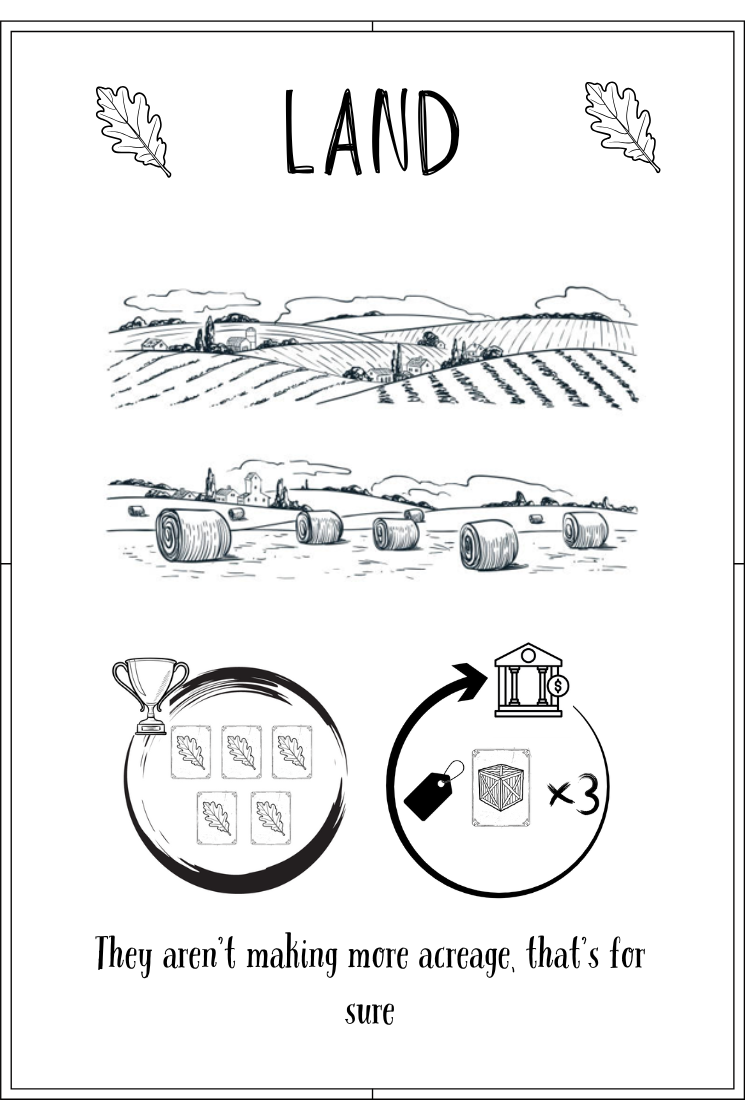From Tortoise to Turtle 🐢

Where there’s muck, there’s brass, people! Today we’re going to be talking all things LAND. In particular, I’ll share some exciting changes we’ve made to the land mechanic in Fortuna.
But first up, a massive welcome to the 20 new subscribers who signed up since the last mail. We’re now up to a grand total of 40 supporters. Loving the exponential growth, guys.
And now to business. Why are we talking about land? Isn’t Fortuna a game about seaborne commerce?
Well, if you have played before you’ll know that FORTUNA is all about risk. The ultimate aim is to quit the uncertain world of business and retire as a ‘gentleperson’. But what does that mean exactly?
Before the industrial revolution, being ‘gentle’ meant more than saying please and thank you a lot and giving up your seat to old ladies on the bus. A ‘gentleperson’ was anyone who was able to live off the income from their property, i.e. someone who was not required to sell their labour to make ends meet. (And our sense of ‘gentle’ meaning ‘well-mannered’ derives from the idea that these high-status individuals supposedly exhibited higher standards of courtesy than everyone else).
Depending on what podcasts you’ve been listening to recently, the idea of living off passive income as a rentier may fill you with either admiration or abhorrence. But back in the day, being ‘genteel’ was unequivocally considered a very honourable condition, conferring trust, respect, and status. After all, only having property could guarantee real freedom – independence from necessity, from the arbitrary will of other people, and from the vagaries of fortune!
In the game, this goal of gentility is represented by two victory conditions. To win, you can either corner the market in a specific commodity by collecting a set, or you can establish a landed estate by playing five land cards. In historical reality, a landed estate would have been a desirable end-goal for many. It was not only more aristocratic and prestigious than trade, it was also – and still is – one of the safest investments. They ain’t making more acreage, after all! It can also ensure the position of your family in time to come. Unlike commerce, the land will continue to produce returns for the dim-witted heir who thinks “double-entry bookkeeping” is some kind of fancy furniture item.
The original idea for FORTUNA was that the commodity strategy would be more of a get-rich-quick scheme that frequently comes a cropper, whilst the land strategy would be more of a slow-and-steady approach. Land cards, once played, cannot be stolen by other players or affected by disaster. This reflects the security of investment in real estate. However, playing a land card uses up your action for that turn, and land is also expensive as you have to buy it from the market for three different commodity cards. Players would thus have to commit early to the more time-consuming land strategy, looking to build an unassailable lead tortoise-style.
After playing literally hundreds of games, it’s clear that this system basically works as intended! However, it’s also gradually emerged that life could be improved for the humble tortoise.
Firstly, it turns out that being a tortoise can be a little boring! Picking up land cards and putting them down isn’t the most dynamic way to play the game. The POLITICAL CONNECTIONS card certainly added some fun “gotcha!” moments into the land player’s narrative, but I think we can do better…

Secondly, land was too expensive. Paying three commodity cards felt like a swizz – and to be honest, it probably was. This meant that tortoises often waited to pick up their land by chance rather than buying it, and the victory felt more like a ‘default’ ending to the game rather than a successful strategy brilliantly executed. In fact, land was usually a passive, back-up strategy that players only became interested in when it suddenly looked like they might win that way.
Finally, there was also a small balance issue. Though land wins quite regularly in 5- and 6-player games, it hardly ever wins in 3-player games. Experienced players eventually realised this and didn’t try to go for the land win in a smaller game.
The good news is that Land is soon going to be a lot less TORTOISE and a lot more TURTLE, thanks to a great new mechanic.
Instead of buying it directly, a player wanting to get their hands on a land card in the market now initiates a LAND AUCTION. All players make a secret bid of commodity cards, and the winner is the one whose cards have the highest total value. In the case of a draw, the initiator wins, giving a slight incentive to initiate.
In a stroke, the land strategy becomes way more dynamic. An unopposed land-grabber will find it easy to storm ahead by offering low bids. Other players will thus have to participate, if only to block the turtle’s way to victory. On the other hand, too much competition for land might lead to multiple turtles blocking each other, offering the parsimonious commodity player an advantage. Players will therefore have to read the game situation, and their opponents. The auction generates more player interaction and provides a new point of interest when it isn’t your turn.
As for balance, we’re going to experiment with reducing the land victory target from 5 to 4 cards for 3- and 4-player games. According to modelling, this should give land roughly a 25% chance of winning in all matches. But, of course, it all depends on the cunning strategies adopted by the players…
What do you think of the changes? Tempted to give the new land strategy a go? Have your say below!



Leave a Reply